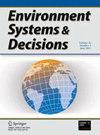保险之外的复原力:危机治理中的协调
Q1 Environmental Science
引用次数: 0
摘要
政府间气候变化专门委员会(IPCC)的最新报告警告说,由于全球变暖和气候变化,强降雨事件增加,这可能给保险公司和企业带来巨大的经济损失。为了应对这一挑战,保险公司正专注于开发新的风险管理策略,并提供洪水保险等新产品。然而,本文认为,有效和可行的协调缩短了恢复时间,因此可以大幅降低危机的金融成本,即保险成本。本文以2021年Ahr河谷洪水为例,分析了德国暴雨事件中危机管理的不足。分析是基于文件分析和访谈进行的,重点关注三个方面的不足:危机工作人员与(1)民间社会、(2)应急响应人员和(3)政治领导人之间的协调。该文件强调了危机期间协调的重要性,这有助于更有效地解决危机,最大限度地减少损失,并使社区更快地恢复元气。本文建议改变政策以改善界面管理和灾害管理协调。本文章由计算机程序翻译,如有差异,请以英文原文为准。
Resilience beyond insurance: coordination in crisis governance
Abstract The latest report by the Intergovernmental Panel on Climate Change (IPCC) warns of an increase in heavy rainfall events due to global warming and climate change, which can result in significant economic costs for insurance companies and businesses. To address this challenge, insurance companies are focusing on developing new risk management strategies and offering new products such as flood insurance. However, the article argues that effective and feasible coordination shortens recovery time and can therefore drastically reduce the financial costs of a crisis—that is, the insurance costs. The paper analyses the deficit in crisis management during heavy rain events in Germany, based on the 2021 Ahr valley flood. The analysis is conducted based on document analysis and interviews and focuses on three areas of deficit: coordination between crisis staffs and (1) civil society, (2) emergency responders, and (3) political leaders. The paper highlights the importance of coordination during a crisis, which can help to address the crisis more efficiently and effectively, minimise damage and get communities back on their feet faster. The paper recommends policy changes to improve interface management and disaster management coordination.
求助全文
通过发布文献求助,成功后即可免费获取论文全文。
去求助
来源期刊

Environment Systems and Decisions
Environmental Science-Environmental Science (all)
CiteScore
9.00
自引率
0.00%
发文量
42
期刊介绍:
Aims and Scope:
Emerging challenges to infrastructure systems, industry, government, and society exhibit complexity, interconnectedness, uncertainties, and a variety of stakeholder perspectives. The Springer journal Environment, Systems & Decisions addresses diverse interests and perspectives of infrastructure owners, engineers, environmental professionals, regulators, policy makers, scholars, educators, and managers through technical articles, editorials, and review articles. The journal advances theory, methodology, and applications to address these challenges from a systems view, emphasizing connectedness of humans, machines, and the environment. Methods that arise in the physical, social, and information sciences and engineering are integrated or coordinated.
Submitted manuscripts should address interrelated social, technological, environmental, and economic systems with attention to performance, risk, costs, sustainability, and resilience. The ESD journal thus provides a catalyst for research and innovation in cross-disciplinary and transdisciplinary methods, featuring decision analysis, systems engineering, risk assessment and risk management, resilience analysis, policy analysis, data science, and communication. Manuscripts in a variety of application domains (engineering, military, environment, ecology, health, regulation, policy, technologies, logistics, manufacturing, etc.) are invited, particularly to feature problems and solutions that cross domains and envision future systems and processes.
Peer Review Policy:
Manuscripts are reviewed with due respect for the author''s confidentiality. At the same time, reviewers also have rights to confidentiality, which are respected by the editors. Environment Systems and Decisions uses a single-blind peer-review system, where the reviewers are aware of the names and affiliations of the authors, but the reviewer reports provided to authors are anonymous. Single-blind peer review is a traditional model of peer review that many reviewers are comfortable with, and the process supports a dispassionate critique of a manuscript. The editors ensure both the authors and the reviewers that the manuscripts sent for review are privileged communications and are the private property of the author.
 求助内容:
求助内容: 应助结果提醒方式:
应助结果提醒方式:


